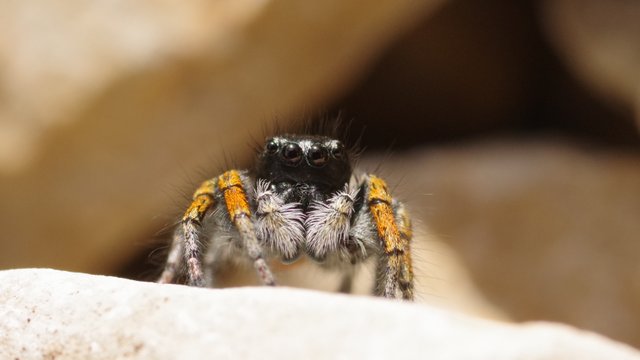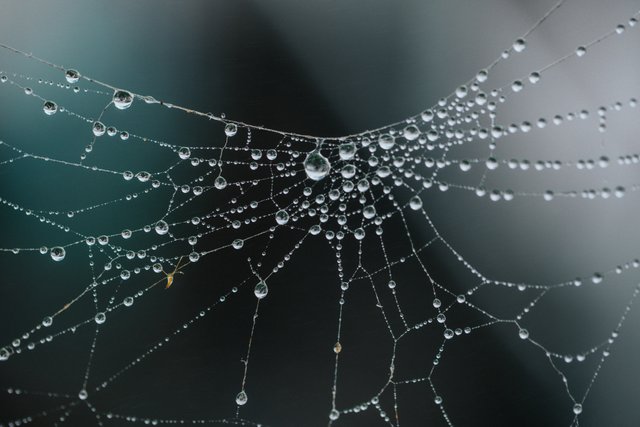Ultimate Better Life||How Can We Keep Spiders Away From Our Homes||06-10-2021
Greetings
I hope You are all fine and safe.
Today I am going to tell You how we can get rid of spiders easily.

source
Spider populations are likely to be on the rise in your neighbourhood right now, according to statistics. While some people appreciate the beauty of spider webs, others are frightened by the prospect of dealing with poisonous creatures.
Some people, mainly those not arachnophobic, may find it difficult to comprehend why so many people are terrified of spiders. Even the most enormous British house spiders, which may reach a limb spread of up to 6-7cm and have a limb span of up to 6-7cm, are unlikely to harm you.
The British Arachnological Society (britishspiders.org.uk), founded by Dr Geoff Oxford, a spider specialist, and enthusiast who also serves as honorary secretary, claims that only a few of the 670 spider species found in the United Kingdom have jaws powerful enough to penetrate human flesh and inject venom. Even though they are not aggressive against humans, he emphasizes that the great majority of documented spider bites result in little to no reaction or discomfort, even in such cases.
Following the advice of the experts at the University of Oxford, spiders are becoming more common in our homes right now since it's that time of year when they're growing and emerging from their hiding locations under furniture and in cracks and crevices in search of a mate.
There is good news that spiders are required in the home since they devour large numbers of creepy crawlies that you do not want in your home.
According to Oxford University, besides being an excellent natural insecticide, spiders offer food for a broad range of other species, including mammalian predatory insects and birds and reptiles and amphibians. A natural supply of insecticides is being investigated in its venom, and its silk has medical potential, such as a framework for artificial joints It should go without saying that spiders and their webs are adorable creatures to see.
Do you still need to make a reservation? Even though many people detest or are scared of spiders, there are various approaches to getting rid of them without squashing them, both harsh and ineffective. Spiders are frequently shown as being disgusted by the scent of citrus, which is particularly repellent to spiders in many children's stories.
Is it true that they genuinely function, on the other hand? We reached out to bathroom design consultant George Holland of Victorian Plumbing and Oxford for his usually contradictory opinions on how to gently entice spiders away from your house. The following is a summary of what we discovered.
The first step is to make your anti-spider spray using ingredients you already have on hand.
By mixing water with 20 drops of citrus juice (such as lemon or lime) or essential oils, as opposed to purchasing a ready-made spider repellent, which may range in price from £4 to £11, Holland argues that you can manufacture your own for considerably less money and effort (such as tea tree or lavender). Spray the corners of your bathroom and any other wet areas to keep spiders from taking up residence.
According to Holland, creating your spray with citrus fruit such as lemon is less expensive, more efficient, and smells fantastic in the bathroom when done correctly.
Oxford believes that there is no evidence to suggest that this will be successful. Conker extract is not harmful to your house, but there is no evidence to support the idea that it may keep spiders away from your home.
Combine all of the ingredients in a glass.
If you want to get rid of spiders, you may cover them with a tumbler, place some cards between the tumbler and the surface, and then release them outside at a distance that is safe from your house. Oxford University recommends this approach for achieving results.

source
His primary worry is that in the United Kingdom, the daddy-long-legs spider and a few other species live exclusively indoors and will almost certainly perish if they are exposed to the elements, particularly during the winter months.
Squeeze the lemon skin to release the juices contained within.
In the Netherlands, this bluff is well-known for its spectacular views. The use of lemon peel on windowsills and in areas where spiders may cluster, such as the space under the toilet or the top of a cabinet. When used in the restroom, citrus works as a deterrent while also giving a pleasant scent to the environment.

source
Some evidence suggests that the scent of lemon peel is appealing to people. However, according to the University of Oxford, there is no evidence that rubbing lemon peel on the skin causes spiders to run.
Use caulk or weatherstripping to seal up any gaps or cracks around windows and doors.
According to Holland, spiders can only enter our homes through cracks or gaps. Therefore caulking around windows and doors will aid in preventing an early invasion of the creatures.

source
The University of Oxford agrees that spiders' ability to construct homes would be hampered. Spiders would have fewer places to call home if the number of cracks and fissures in the environment were reduced. According to him, certain spiders, such as daddy long-legged spiders, do not use hideaways as their primary residence.
Maintain an environment that is free of clutter and disorder at all times.
According to Holland, keeping your home clean and organized may assist in keeping spiders away from your home. When you clean your home thoroughly, you may eliminate spider-attracting pollutants from the air, such as dust, small insects, and food particles that may have been inhaled. When there is less debris, it is less probable that a spider's web will be formed.

source
Even though there is less evidence that spiders actively enter homes and consume living prey rather than food particles in a clean, uncluttered environment, Oxford University maintains that spiders intentionally enter homes. He claims that spiders are not attracted to dust or food particles, as is often believed.
Room sprays and candles scented with citronella.

source
Using an air freshener or a citronella candle to keep spiders away from entire rooms is suggested by Holland. Still, Oxford is sceptical, noting that there is no proof that this method is effective. You may make your spider repellent and use it to target specific spider-prone areas.
Plants that repel spiders should be included in your landscaping design.
According to Holland, the essential oils of mint, lemongrass, and eucalyptus not only help keep spiders away from your bathroom but also have a pleasant scent.

source
As an alternative, Oxford claims to have never heard of a plant that may be used as a natural spider deterrent due to its scent. Some plants in gardens are better at sustaining spider webs than others has absolutely nothing to do with this.
Moreover, many spider species, such as the garden spider, prefer to develop and defend their egg sacs on the leaves of mint species, even when alternative non-aromatic plant species are accessible.
Here Is my First Achievement Post
Achievement 1 ||Disabled Person ||Through Introduction Post
I Hope You will Find This Information Useful
Thank You
Have a nice day

Luar biasa
❤❤😊😊